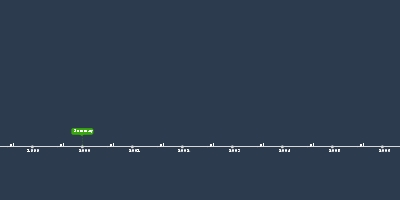14 magg 1989 anni - election of 1988
Descrizione:
family values:A political platform of conservative morality endorsed by the Religious Right in the 1980s, and subsequent decades, including support for the traditional nuclear family and opposition to homosexuality and abortion.Ronald Reagan’s role in facilitating the end of the Cold War stood among his most important achievements. Overall, like most presidencies, his had a mixed legacy. Despite his pledge to get the federal government “off our backs,” he did not reduce its size or scope. Social Security and other entitlement programs remained untouched, and increased military spending outweighed cuts in other programs. The religious right had contributed to Reagan’s victorious electoral coalition, but he did not actively push their most controversial policies — such as a constitutional amendment banning abortion. He did call for tax credits for private religious schools, restrictions on abortions, and a constitutional amendment to permit prayer in public schools, but did not expend his political capital to secure these measures (see “Comparing Interpretations”).
Although Reagan failed to roll back the social welfare and regulatory state of the New Deal–Great Society eras, he did alter the dynamic of American politics. The Reagan presidency restored popular belief that the nation — and individual Americans — could enjoy ever-increasing prosperity. His antigovernment rhetoric won many adherents, as did his bold and fiscally aggressive tax cuts. Social-welfare liberalism, ascendant since 1933, remained intact but was now on the defensive. Conservatives, led by Reagan, had changed the political conversation.
George H. W. Bush, Reagan’s vice president and successor, was not seen by conservatives as one of their own. But he possessed an insider’s familiarity with government and a long list of powerful allies, accumulated over three decades of public service. Bush’s route to the White House reflected the post-Reagan alignments in American politics. In the primaries, he faced a spirited challenge from Pat Robertson, the archconservative televangelist whose influence and profile had grown during Reagan’s two terms. After securing the presidential nomination, won largely because of his fierce loyalty to Reagan, Bush tapped as his vice-presidential running mate an unknown and inexperienced Indiana senator, Dan Quayle. Bush chose Quayle in part to secure the Christian “ family values” vote — Quayle had been a quiet, but effective, advocate for the family values movement in the Senate. Robertson’s challenge and Quayle’s selection showed that the Religious Right had become a major force in Republican politics.
On the Democratic side, Jesse Jackson became the first African American to challenge for a major-party nomination, winning eleven states in primary and caucus voting. However, the more staid Michael Dukakis, the governor of Massachusetts, emerged as the Democratic nominee. The Northeast liberal Dukakis fared poorly among the constituencies Democrats had lost in the 1970s: southern whites, midwestern blue-collar Catholics, and middle-class suburbanites. Indeed, Bush made a point of attacking Dukakis as a “liberal” by calling him a “card-carrying member of the ACLU” (a prominent liberal organization), a not-so-subtle reference to J. Edgar Hoover’s 1958 phrase “card-carrying communist.” Bush won with 53 percent of the vote, a larger margin of victory than Reagan’s in 1980. The election confirmed a pattern in presidential politics that would last through the turn of the century: every four years, Americans would refight the battles of the 1960s, with liberals on one side and conservatives on the other.
Aggiunto al nastro di tempo:
Data:
14 magg 1989 anni
Adesso
~ 36 years ago
